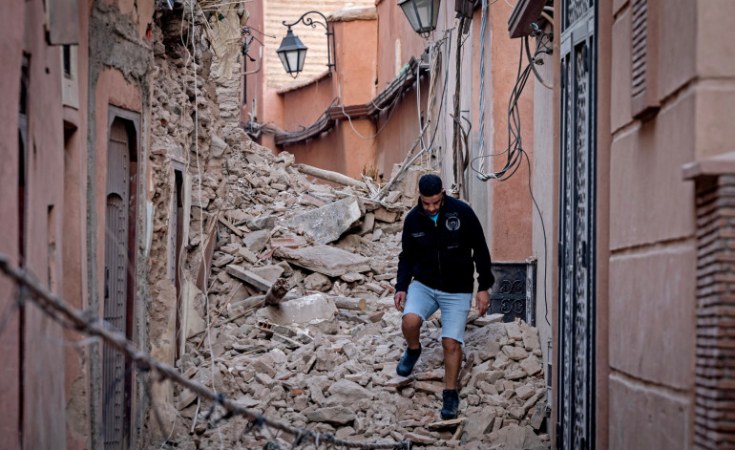In a seismic tragedy, a powerful earthquake measuring 6.8 on the Richter scale struck Morocco, exacting a grim toll of over 2,000 lives and leaving more than 2,000 individuals injured. The earthquake, the most potent to hit the North African nation in a century, occurred late Friday, ravaging various regions, including El-Houz, Taroudant, Chichaoua, Tiznit, Marrakech, Azilal, Agadir, Casablanca, and Youssoufia.
It has since prompted global response, with leaders from around the world offering condolences and assistance.
Rwandan President Paul Kagame expressed profound sympathy and solidarity, conveying: "On behalf of all Rwandans, I express our deepest sympathy and solidarity with King Mohammed VI, the families of the victims, and the people of Morocco in this moment of profound tragedy." Kagame pledged unwavering support from Rwanda during this trying time.
On behalf of all Rwandans, I express our deepest sympathy and solidarity with King Mohammed VI, the families of the victims and the people of Morocco in this moment of profound tragedy. Rwanda stands with Morocco in this difficult time.-- Paul Kagame (@PaulKagame) September 9, 2023
Nigerian President Bola Tinubu reaffirmed his nation's commitment to Morocco, declaring that Nigeria would remain steadfast in its support as Morocco embarks on the arduous journey of recovery and rebuilding from this catastrophic event.
Kenyan President William Ruto extended a hand of support, stating, "Kenya stands with the people of Morocco as they grapple with the devastating effects of the earthquake that struck their nation." While South Africa's Cyril Ramaphosa, represented by Deputy President Paul Mashatile due to his absence at the G-20 summit in New Delhi, conveyed their heartfelt condolences. Mashatile lauded Morocco's emergency response efforts and expressed unwavering confidence in the nation's resilience and determination to recover from this calamity.
ALSO READ: Morocco earthquake: World leaders offer solidarity, death toll rises to over 2,000
China's President Xi Jinping reached out to Morocco's King Mohammed VI, expressing shock and sorrow over the earthquake's heavy casualties and property losses. The World Health Organization reported that over 300,000 people have been affected by the disaster. Morocco declared three days of mourning, with King Mohammed issuing orders to mobilize specialized search and rescue teams and establish a surgical field hospital.
United Nations Secretary-General Antonio Guterres offered his condolences and reiterated the UN's readiness to assist Morocco in aiding the affected population. The challenging terrain of the High Atlas region, where many settlements are remote and houses have been reduced to rubble, added complexity to relief efforts.
International support surged as several nations stepped forward to provide assistance. The Red Cross Society of China pledged $200,000 in cash for emergency humanitarian aid, while Algeria opened its airspace to flights carrying humanitarian assistance. Tunisia dispatched a rescue team to aid in search and rescue operations, and Turkiye expressed readiness to offer support. Qatar's Prime Minister extended condolences and pledged to provide necessary assistance.
Other global leaders, including French President Emmanuel Macron, German President Frank-Walter Steinmeier, and Russian President Vladimir Putin, joined in with condolences to Morocco during this challenging time. As Morocco grapples with the aftermath of this catastrophic earthquake, the outpouring of international support and solidarity continues unabated.
----
TEN KEY FACTS ABOUT MOROCCO EARTHQUAKE
1) On 8 September, at 11:11 pm local time, an earthquake struck central Morocco.
2) Magnitude of earthquake: The earthquake measured 6.8 on the Richter scale.
3) Epicentre: The epicenter was located in the High Atlas Mountains, southwest of Marrakesh city.
4) Depth: The earthquake occurred at a depth of 18.5 km, according to the US Geological Survey.
5) Affected areas: The earthquake impacted several municipalities, including al-Haouz, Marrakesh, Ouarzazate, Azilal, Chichaoua, and Taroudant.
6) Historical impact: This earthquake is considered the most powerful earthquake to hit Morocco in a century.
7) Aftershocks: Hundreds of aftershocks were recorded, with the strongest reaching up to a magnitude of 5.9.
8) Casualties: As of 10 September, at least 2,012 people were reported killed, with 2,059 injured, including 1,404 people in critical condition. Most fatalities were in al-Haouz municipality. Approximately 380,000 people were exposed to the earthquake's impact within a 50 km radius of the epicentre, with nearly 30,000 living within 15 km and considered the most impacted.
9) Ongoing rescue operations: Some individuals are still trapped under collapsed buildings, awaiting rescue.
10) Comparison with previous earthquake: The last significant earthquake in Morocco, with a magnitude of 6.5, occurred in 2004 in the northern Rif Mountains, resulting in about 600 casualties and extensive displacement.


